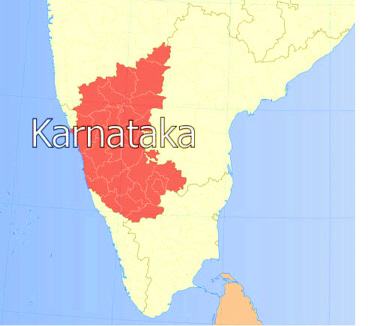ಕನ್ನಡ

(Bildquelle: PlaneMad/Wikipedia. -- CC-by-sa)
An Elementary Grammar of the Kannada, or
Canarese Language
by Thomas Hodson
31. Syntax of the Affirmative Mood (§§ 261
- 264)
Zitierweise / cite as:
Hodson, Thomas: An elementary grammar of the
Kannada, or Canarese language. -- 31.
Syntax of the Affirmative Mood (§§ 261 - 264). -- Fassung vom 2011-08-27. -- URL:
http://www.payer.de/hodson/hodson31.htm
First published as: Hodson,
Thomas: An elementary grammar of the Kannada, or Canarese language ; in
which every word used in the examples is translated, and the pronunciation is
given in English characters. -- 2. ed. -- Bangalore : Wesleyan Mission Press,
1864. -- 128 p. ; 23 cm.
First time published here:
2011-08-27
Revisions:
©opyright: Public domain
This text is part of the section
Sanskrit und Indien of
Tüpfli's Global Village Library
If you don't get the
diacritics displayed, install a Unicode font like Tahoma.
Syntax [ಪ್ರಯೋಗ prayōga]
of the Affirmative Mood [ನಿಶ್ಚಯರೂಪ niścayarūpa]
0. Contents
- 1. Present Tense [ವರ್ತಮಾನ vartamāna]
- 2. Past Tense [ಭೂತ bhūta]
- 3. Future Tense [ಭವಿಷ್ಯತ್ತು bhaviṣyattu]
- 4. Contingent Future
1. Present Tense [ವರ್ತಮಾನ vartamāna]
261. The Present Tense is commonly used to
express future action; as,
- ಇಪ್ಪತ್ತು ದಿವಸದಲ್ಲಿ
ಬರುತ್ತಾನೆ ippattu divasadalli baruttāne, He will
come in three weeks.
- ತಿಂಗಳಾದೆ ಮೇಲೆ ಹೋಗುತ್ತೇವೆ tiṃgaḷāda mēle hōguttēve, We shall go
a month hence.
- ನಾಳೇ ಕೊಡುತ್ತೀಯೋ nāḷē koḍuttīyō, Will you give it
tomorrow?
These sentences may be rendered, "He is
coming," "We are going," &c.
2. Past Tense [ಭೂತ bhūta]
262. The Past Tense is very often used for
the future in expressing readiness or immediate action, as,
- ಇಲ್ಲಿಗೆ ಬಾ illige bā, Come here!
ಬಂದೆ baṃde, I shall
come, or, I am coming.
- ಈ ಕೆಲಸಾ ಮಾಡು ī kelasā māḍu, Do this work!
ಮಾಡಿದೆ māḍide, I
shall do it (immediately).
3. Future Tense [ಭವಿಷ್ಯತ್ತು bhaviṣyattu]
263. The Future Tense is frequently used
for the present and past; as,
- ಕಾಶಿಯಲ್ಲಿ ಒಬ್ಬ ವಿದ್ವಾಂಸನು
ಇರುವನು kāśiyalli obba vidvāṃsanu iruvanu,
There lived, (or lives) a learned man in Benares.
- ಅಂಗ ದೇಶದಲ್ಲಿ ಒಂದು ಪಟ್ಣ
ಇರುವದು aṃga dēśadalli oṃdu paṭṇa iruvadu,
There was (or is) a city in the Aṅga country.
- ಪೂರ್ವ ಕಾಲದಲ್ಲಿ ಒಬ್ಬ ಅರಸನು
ಇರುವನು pūrva kāladalli obba arasanu iruvanu,
In old time there (will be, i.e.) was a king.
The Future Tense is often used to express
habitual action, as,
- ವರ್ತಕರು ವ್ಯಾಪಾರ ಮಾಡುವರು
vartakaru vyāpāra māḍuvaru, Merchants
trade.
4. Contingent Future
264. The Contingent Future expresses
probability, possibility, and capability; as,
- ಮಳೆ ಬಂದೀತು maḷe baṃdītu, It may (is likely to)
rain.
- ಆದೀತು ādītu, Perhaps; it may be so.
- ಹೋದಾರು hōdāru, They will most probably go.
- ಹಾಗೆ ಹೇಳ್ಯಾನು hāge hēḷyānu, He will very likely (he
may possibly,) say.
- ಆ ಕೆಲಸಾ ಮಾಡೇನು
ā kelasā māḍēnu, I can do that work.
To 32. Syntax of the Potential and Subjunctive Moods (§§ 265 - 266)

